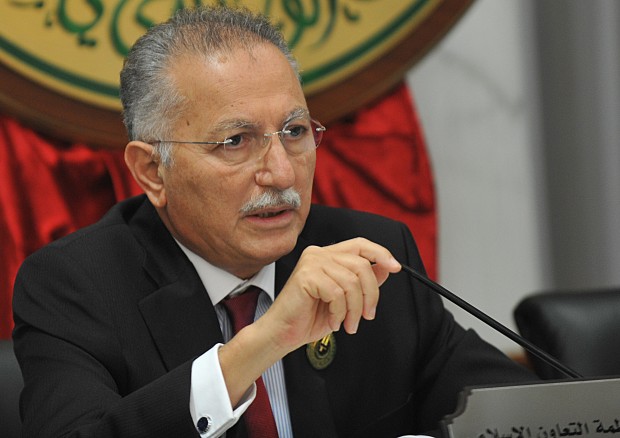
Secretary-General of the Organization of Islamic Cooperation Ekmeledin İhsanoğlu. (FAYEZ NURELDINE/AFP/GettyImages)
There have been a lot of positive reactions to the news that Turkey’s secular opposition have joined with nationalists to back a pious former Secretary-General of the Organization of the Islamic Conference as its candidate for the country’s first-ever direct presidential elections this August.
Across the opposition media, columnists have lined up to sing Ekmeleddin İhsanoğlu’s praises: his brilliant mind, his fluency in four languages, his religious moderation, his unfailing gentlemanliness, and the fact that his wife doesn’t wear a headscarf. His selection is a “game-changer,” we are told, and it has caused “deep anxiety” within the ranks of Turkey’s ruling Justice and Development (AKP) government. For Prime Minister Recep Tayyip Erdoğan, the man everyone expects to be the AKP’s presidential candidate, August 10 will be a “Waterloo.” Even the habitually cautious Bloomberg News has described his candidacy as “a sign that at last [the secular opposition] may be approaching that moment when lost political parties . . . become electable again.”
In a sop to hardliners among the secular opposition’s traditional support base, İhsanoğlu immediately assured the secular daily Cumhuriyet of his loyalty to the principles of Mustafa Kamal Atatürk, the founder of the Turkish Republic. But it was not the secularist vote the opposition was thinking of when it selected him; it was that section of Turkish society that has voted overwhelmingly for the government over the past decade: less urban, less well-educated, less wealthy and more pious. In recent elections, the country’s secularist and nationalist parties have picked up at most 44 percent of the vote between them. To block yet another electoral victory for Erdoğan’s party, they desperately need to appeal to a wider public.
And despite the obvious shortcomings of İhsanoğlu’s candidacy—above all the fact that he is little known inside Turkey—it is possible they could do that. For some time now, polls have shown that even pro-government voters are ambiguous about Erdoğan’s desire to push through what would in effect be regime change in Turkey, replacing the existing parliamentary system with a strong presidential one. Unease at the government’s growing authoritarianism is on the rise too.
İhsanoğlu certainly looks the sort of man who could help bridge the gap between the secularists and the great Turkish public. He is a graduate of Cairo’s Al-Azhar and a scholar of Islam with numerous books to his name. More tellingly, his father was a close friend of the famous poet Mehmet Akif Ersoy, a religious nationalist whose verse Erdoğan is forever quoting in his speeches. The two men fled to Egypt together in the 1920s to escape from Atatürk’s single-party regime.
His great weakness, however, is that he comes across as aristocratic, and the Turkish conservatism that the AKP government represents is anything but aristocratic. As Nuray Mert put it in a recent article, “Ekmeleddin İhsanoğlu may very well know religion and religious affairs infinitely better than the vast majority of AKP supporters . . . but that simply isn’t what matters to conservatives . . . What matters to them is to be represented by someone like them, someone who has experienced their own sense of injustice and has rebelled against it.”
In selecting him, the son of a prominent Ottoman intellectual, there is a risk that the opposition parties have mistaken the grandiloquent neo-Ottoman discourse of the government, its endless references to the greatness of the “forefathers,” its nostalgic talk of the Turkish nation as Islam’s great protector, for a real desire to turn back the clock and warm up the cold corpse of empire. Whereas, in fact, this is rhetoric which, above all, fulfils a psychological need in the listener (and the speaker too) filling them with the sense that they are on the right side of history, climbing out of their hole towards the sun.
It’s a little bit like the revolutionary rhetoric that Karl Marx talks about at the start of The Eighteenth Brumaire of Louis Bonaparte, describing how the French revolutionaries posed as Romans and the 17th-century English Republicans as Old Testament saints as they rose to power. He wrote, “At the very time when men appear engaged in revolutionizing things and themselves . . . do they anxiously conjure up into their service the spirits of the past, assume their names, their battle cries, their costumes to enact a new historic scene in such time-honored disguise.”
As soon as the revolution was over, Marx says, the French dropped Rome for 19th-century liberalism and the English dropped the prophet Habbakuk for John Locke. Whatever the result of the August presidential elections, Turkey’s revolution is now over. The old Kemalist Republic is dead. What is still unclear is what the future will look like. But it seems slightly unlikely Ekmeleddin İhsanoğlu will have much of a part to play in it.
This article was originally published in The Majalla.
All views expressed in this blog post are those of the author and do not necessarily represent the views of, and should not be attributed to, The Majalla magazine or Asharq Al-Awsat newspaper.
